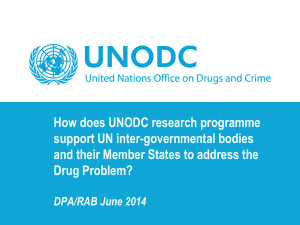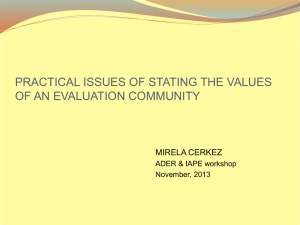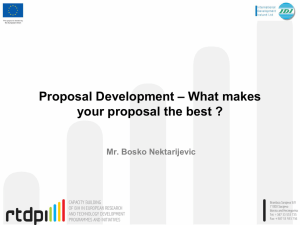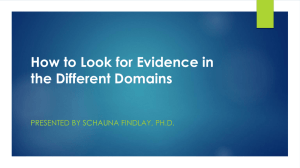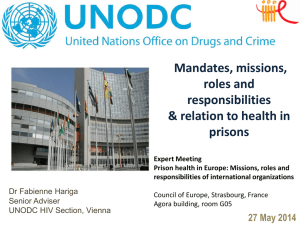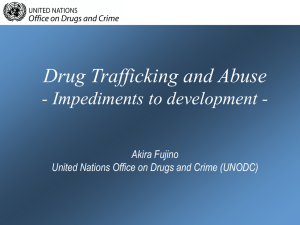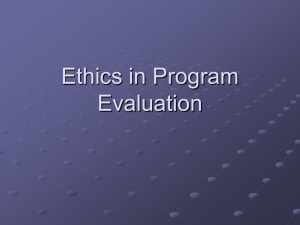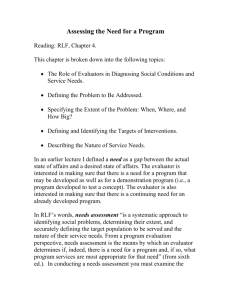UNESCO Guidelines for the Preparation of Evaluation Terms of
advertisement
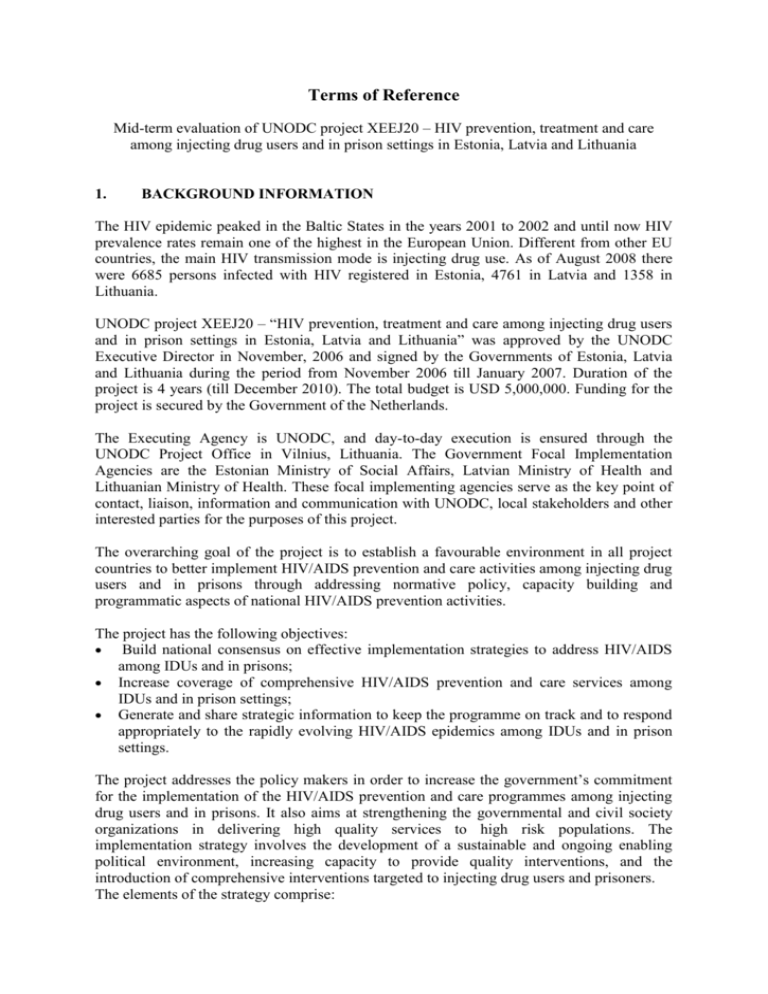
Terms of Reference Mid-term evaluation of UNODC project XEEJ20 – HIV prevention, treatment and care among injecting drug users and in prison settings in Estonia, Latvia and Lithuania 1. BACKGROUND INFORMATION The HIV epidemic peaked in the Baltic States in the years 2001 to 2002 and until now HIV prevalence rates remain one of the highest in the European Union. Different from other EU countries, the main HIV transmission mode is injecting drug use. As of August 2008 there were 6685 persons infected with HIV registered in Estonia, 4761 in Latvia and 1358 in Lithuania. UNODC project XEEJ20 – “HIV prevention, treatment and care among injecting drug users and in prison settings in Estonia, Latvia and Lithuania” was approved by the UNODC Executive Director in November, 2006 and signed by the Governments of Estonia, Latvia and Lithuania during the period from November 2006 till January 2007. Duration of the project is 4 years (till December 2010). The total budget is USD 5,000,000. Funding for the project is secured by the Government of the Netherlands. The Executing Agency is UNODC, and day-to-day execution is ensured through the UNODC Project Office in Vilnius, Lithuania. The Government Focal Implementation Agencies are the Estonian Ministry of Social Affairs, Latvian Ministry of Health and Lithuanian Ministry of Health. These focal implementing agencies serve as the key point of contact, liaison, information and communication with UNODC, local stakeholders and other interested parties for the purposes of this project. The overarching goal of the project is to establish a favourable environment in all project countries to better implement HIV/AIDS prevention and care activities among injecting drug users and in prisons through addressing normative policy, capacity building and programmatic aspects of national HIV/AIDS prevention activities. The project has the following objectives: Build national consensus on effective implementation strategies to address HIV/AIDS among IDUs and in prisons; Increase coverage of comprehensive HIV/AIDS prevention and care services among IDUs and in prison settings; Generate and share strategic information to keep the programme on track and to respond appropriately to the rapidly evolving HIV/AIDS epidemics among IDUs and in prison settings. The project addresses the policy makers in order to increase the government’s commitment for the implementation of the HIV/AIDS prevention and care programmes among injecting drug users and in prisons. It also aims at strengthening the governmental and civil society organizations in delivering high quality services to high risk populations. The implementation strategy involves the development of a sustainable and ongoing enabling political environment, increasing capacity to provide quality interventions, and the introduction of comprehensive interventions targeted to injecting drug users and prisoners. The elements of the strategy comprise: Involvement of all governmental and non-governmental stakeholders in project design, implementation and monitoring; Completion of comprehensive baseline measurements and needs assessments across all framework elements; Reviews of the legislative, administrative and operational environments, followed by normative advocacy and assistance in redrafting; A study tour by policy makers, service providers to countries which provide comprehensive HIV prevention and care services for injecting drug users and in prisons; Development and introduction of relevant tools, training curricula, accreditation and quality control protocols; The establishment of a regional capacity-building centre and information network; The establishment of a critical mass of trained and accredited service providers; Introduction of comprehensive interventions for injecting drug users and in prisons; Independent mid-term and end of project evaluations. The following main performance indicators are formulated for the project: Countries adopt national HIV/AIDS strategies which include comprehensive HIV/AIDS prevention and care measures for injecting drug users and inmates; Increasing number of injecting drug users and inmates are provided with services; Training/workshops implemented with full participation of key service providers; Increasing number of sites providing comprehensive HIV/AIDS prevention and care services; Increasing number of prisons offering comprehensive HIV/AIDS prevention and care services for inmates; Annual project progress reports and other strategic information is documented and disseminated. 2. PURPOSE OF THE EVALUATION The overall purpose for the evaluation is to learn from the project implementation so that lessons can be drawn that can be the basis for instituting improvements to further project planning, design and management. The purpose of evaluation is to measure progress towards achievement of the expected outcomes and to assess the measures that the project has put in place in order to create positive impact in the future. Mid-term evaluation is foreseen in the project document signed by the three Governments and UNODC. It is initiated by UNODC Project Office for the Baltic States, and it is agreed with UNODC Independent Evaluation Unit, HIV Unit and the Donor Government. The main stakeholders are the Ministries of Health and Ministries of Justice in Estonia, Latvia and Lithuania, service providers, civil society organisations and UNODC. 3. EVALUATION SCOPE The mid-term evaluation should cover implementation period from November, 2006 to October, 2008. The geographical scope of the evaluation is Estonia, Latvia and Lithuania. While the main emphasis should be on measuring outcomes and sustainability, the evaluation should also cover the project concept and design, implementation, results and outputs. The evaluation should include findings, lessons learned and recommendations in the following areas: An analysis of how efficiently project planning and implementation are carried out. Are management arrangements of the project such that efficient execution and implementation is guaranteed? Relevance and attainability of the objectives. Whether the project addresses the identified needs to ensure sufficient focus on specific issues related to HIV and AIDS among IDUs and in prisons. Are the project objectives still relevant? What is the value of the project in relation to other priority needs and efforts? Is the problem addressed still a major problem? Whether the project contributes to a priority area or comparative advantage for UNODC, Assess progress made towards achievement of the planned results and expected outcomes, in particular: o capacity building of governmental and non-governmental organizations to better address HIV/AIDS among IDUs and in prison settings. This includes assessment of project’s contribution to human and institutional capacity building; o increase in coverage of comprehensive HIV prevention services for IDUs; o amendment of national HIV/AIDS strategies and action plans. The usefulness of results and outcomes; What impact the project is most likely to have? Have the measures been put in place to create positive impact in the future? Sustainability of results and benefits. Are the initiated activities likely to continue after donor funding ends? Do the beneficiaries accept the project, are they willing to continue, and is the host institution developing the capacity and motivation to administer it? Can the activity become self-sustaining financially? Will the results continue after the project funding? Effectiveness: Is the project achieving satisfactory progress toward its stated objectives? Problems and constraints encountered during implementation; The role played by UNODC Project Office in the implementation of the project. 4. EVALUATION METHODS The mid-term evaluation should include but not necessarily limit to the following methods: desk review of relevant documents (project document, quarterly, semi-annual and annual project reports, minutes of technical meetings, reports on project activities, relevant national policy documents etc.); individual and/or group interviews with members of the Project Steering Committee (main governmental stakeholders and civil society), representatives of the counterparts and implementing partners; interviews with representatives of the project beneficiaries; meeting with representatives of UNAIDS co-sponsors present in the Baltic States; field visits to services developed/supported under the project; conference calls with representatives from the UNODC HIV/AIDS Unit; questionnaires. The evaluation consultant should present a detailed statement of proposed evaluation methods in the technical proposal. The evaluator has to take into account the Guiding Principles for Evaluations at UNODC (Annex 1). 5. EVALUATION TEAM COMPOSITION Evaluation should be conducted by an independent expert without prior involvement in the project. The evaluator will not act as representative of any party and should remain independent and impartial throughout the evaluation. 6. PLANNING AND IMPLEMENTATION ARRANGEMENTS 6.1. Planning and reporting arrangements The evaluation should be planned and conduced in close consultation with UNODC Project Office for the Baltic States. The evaluation tools and methodology must be agreed with the UNODC Project Office for the Baltic States. Project Office will provide the necessary substantive support, including travel arrangements, organisation of meetings and submission of all documents for desk review. Although the evaluator should be free to discuss all matters relevant to this assignment with the authorities concerned, he/she is not authorized to make any commitment on behalf of UNODC. The evaluator reports directly to UNODC Project Office for the Baltic States. The report will contain the findings, conclusions and recommendations of the mid-term evaluation as well as a recording of the lessons learned during project implementation. The draft report must be discussed with the project counterpart agencies, the representative of the donor and, to the extent possible, with other parties involved in the project. While considering the comments provided on the draft, the evaluation expert would use his/her independent judgment in preparing the final report. The report should not be longer than 25 pages, excluding the annexes and the executive summary. The report should be developed with respect to the following chapters: - executive summary (maximum 4 pages) - introduction - background (project description) - evaluation purpose and objective - evaluation methodology - major findings - lessons learned (from both positive and negative experiences) - constraints that impacted project delivery - recommendations and conclusions. Annexes to the evaluation report should be kept to an absolute minimum. Only those annexes that serve to demonstrate or clarify an issue related to a major finding should be included. Existing documents should be referenced but not necessarily annexed. Maximum number of pages for annexes is 15. After completing the evaluation process, consultant should fill in the Evaluation Assessment Questionnaire (Annex 2). 6.2. Timeframe and work plan Expected engagement: 27 working days during 1 November - 22 December 2008, two missions to the Baltic States: 17 – 28 November 2008, 17-18 December 2008. Task Number of w/days Desk review of project document, 5 reports and other relevant documents Timeline 3-7 November Outcome Draft inception report with detailed evaluation plan and methodology prepared; including draft evaluation tools (interview sheets; questionnaires) Inception report finalised, methodology and evaluation plan agreed Briefing of evaluator by the 1 responsible official at the HIV Unit, UNODC HQ (Vienna) and Regional Coordinator for the Baltic states (by phone) 12 November Mission to the Baltic states: 10 meetings and interviews with identified stakeholders, identified beneficiaries and collaborative partners; debriefing with the Regional Coordinator Data analysis and preparation of draft 5 report 17–28 November Data from major stakeholders collected; Exit minutes prepared and discussed 1-5 December Receiving feedback on draft report, 2 incorporating comments Stakeholder meeting (mission to 2 Lithuania) 15-16 December 18 December Evaluation draft report with findings, lessons learned and results submitted to UNODC for review Evaluation report refined Finalisation of the evaluation report 22 December 2 Evaluation findings presented and recommendations refined Final evaluation report submitted to UNODC 7. COMPETENCIES AND SKILLS REQUIRED FOR EVALUATION EXPERT Advanced university degree in social sciences, medicine or public health, with specialized training in evaluation and project/program management; At least 5 years of international experience in designing and managing program/project evaluations including in the area of HIV/AIDS prevention and care services for most-at-risk groups (injecting drug users, inmates, sex workers); Proven experience in conducting independent evaluations of HIV prevention projects/programmes; experience in evaluating HIV prevention projects targeting IDUs is an asset. Familiarity with HIV/AIDS epidemics and substance abuse in the Central and Eastern Europe region; Knowledge of the UN guiding principles/recommendations on HIV/AIDS prevention and care among injecting drug users and in prison settings; Personal skills: good communication, analytical and drafting skills; Fluency in English; fluency in Russian, Estonian, Latvian or Lithuanian is an asset. Annex 1 GUIDING PRINCIPLES FOR EVALUATIONS AT UNODC INTRODUCTION These principles for evaluation are a set of guidelines for professional practice of evaluators who undertake evaluations of the activities of UNODC. They should guide the professional practice of evaluators and the evaluation function as well as inform the UNODC, other stakeholders and the general public about the principles that they can expect to be upheld by the professional practice of evaluation in UNODC. There is a great diversity in the evaluation profession, with practitioners coming into the profession from different training backgrounds, experience, work settings and hence the perceptions about the primary purpose of evaluation is also diverse. Despite this diversity, evaluators should be bound by one common desire “to construct and provide the best possible information and advice that might bear on the value of what is being evaluated”. These principles must foster this primary aim. PRINCIPLES Independence and impartiality Independence, objectivity and impartiality of evaluators and the evaluation process provides the credibility and legitimacy to the evaluation: 1. The evaluation process should be independent and impartial with regard to the activities being evaluated and free from any pressure or influence that evaluators may receive in carrying out an evaluation. Impartiality enhances the credibility of evaluation and avoids bias, and independence provides legitimacy and helps to reduce the potential for conflicts of interest. Policy makers and programme managers should not evaluate their own work or manage the evaluation process. The requirement for independence and impartiality must transcend all stages of the evaluation process including planning, formulation of terms of reference and the selection of the evaluation team. Evaluators should enjoy the full independence in carrying out evaluations. In cases where evaluators are exposed to pressure or influences as to the findings, analysis or conclusions of the evaluation, they should inform the Independent Evaluation Unit at UNODC as soon as possible. 2. The evaluation process should be independent from programme/project delivery and the management of the activities being evaluated, including the management and administrative structures that are responsible for programme/project delivery. 3. The institutional and management arrangements at UNODC therefore must ensure the independence of the Evaluation Unit from the line management functions of programme delivery. Impartiality and independence will be achieved by separating the evaluation function from the line management responsible for programme management as well as separating programme line management from evaluation management. Stakeholder Participation in Evaluation Participation of various stakeholders in the evaluation process is paramount. 1. The various stakeholders must participate in the evaluation process in order to ensure that the evaluation findings fully reflect the different interests and needs of the many partners that are involved in the UNODC activities. In this regard, it is important that various stakeholders and other partners participate in the evaluation process by providing their views and interests on the evaluation in question. The terms of reference should address the concerns of all stakeholders. The roles of each stakeholder during the evaluation must be clearly defined. 2. In the case of the evaluation on activities financed by the extra-budgetary resources, it is particularly important that both donor and recipient countries are involved in the process of evaluation by providing inputs to the formulation of terms of reference. They should also express their views on the impact of the programme/project activities as well as discuss the results of the evaluation. Competence Evaluators should remain competent and rigorous in their practice of evaluation, and fairly represent their competence and experience to UNODC and other stakeholders. 1. Evaluators should possess the education, knowledge, expertise, abilities, skills and experience appropriate to undertake the proposed evaluation of a particular field. 2. Evaluators should professionally represent their competence and should not practice beyond the limits of their professional training and competence. In this regard evaluators should decline to conduct evaluations that fall substantially outside those limits. 3. Evaluators should continually seek to improve their competences in order to remain relevant and to provide the highest level of performance in their evaluation work. Integrity/Honesty Evaluators must show honesty, integrity, objectivity and fairness in the entire evaluation process. 1. Evaluators should discuss honestly with the UNODC and other relevant stakeholders issues concerning costs, tasks to be undertaken, limitations of methodology, scope of results likely to be obtained and uses of data resulting from a specific evaluation. It is the primary responsibility of the evaluators to initiate discussions and clarifications on these matters. 2. Evaluators should record all changes made in the originally agreed evaluation plans and the reasons why the changes were made. If those changes would significantly affect the scope and likely results of the evaluation, the evaluator should inform UNODC Independent Evaluation Unit in a timely fashion of the changes and their likely impact. If the changes are likely to increase the evaluation costs, then authority must be sought from UNODC before the work can proceed. 3. Evaluators should disclose any roles or relationships they have concerning the activities being evaluated that might pose a significant conflict of interest with their role as an evaluator. Any such relationships that pose potential conflict should be raised with IEU at the time when the assignment is being offered to avoid proceeding with an evaluation where there may be conflict of interests. 4. Evaluators should not misrepresent their findings or views of those they interview. They also should not knowingly make, prepare or certify as true any oral or written statement, which is false, incorrect, misleading or incomplete. Evaluators must always acknowledge or cite sources of information and avoid plagiarism or other unethical behaviour. 5. Evaluators should not receive any instructions, pressure, or influences from any person, which may distort the objective findings, analysis or conclusions of the evaluation. Evaluators should also enjoy access to any sources of information or data, which they find necessary for the evaluation. They should not be deliberately prevented from such an access, and where this happens they should immediately inform UNODC- IEU. Evaluators should inform UNODC Independent Evaluation Unit in a timely manner if undue pressure is brought to bear on them during an evaluation. 6. If evaluators determine that certain procedures or activities seem likely to produce misleading evaluative information or conclusions, they have the responsibility to communicate their concerns, and the reasons for them, to UNODC. If discussions with UNODC do not resolve these concerns, so that a misleading evaluation is then implemented, the evaluator may legitimately decline to conduct the evaluation if that is feasible and appropriate. Other alternatives include placing a dissenting cover letter or appendix that explains the circumstances. 7. Evaluators should only use reasonable criticism and should not attempt to maliciously damage the professional reputation, practice or prospects of professionals whose programmes and projects they evaluate or others in the field of evaluation. Evaluators must avoid using offensive or demeaning language. 8. All evaluation reports, results and other findings should be held as confidential until released by UNODC. Confidentiality arrangement should extend to the storage and disposal of all information collected. Systematic Inquiry Evaluators conduct systematic, databased inquiries about the activities evaluated. 1. Evaluators should identify themselves to potential informants or respondents and advise them of the purpose of the evaluation. Normally evaluators should produce some identification or a letter that shows that they have been contracted by UNODC. 2. The informed consent of those directly providing information should be obtained. They should be advised as to what information will be sought, how the information will be recorded and used, and the likely risk and benefits arising from their participation in the evaluation. In the case of minors and other dependents informed consent should also be sought from parents or guardians. 3. Evaluators should adhere to the highest professional standards in conducting their work, whether that work is quantitative or qualitative in nature, so as to increase the accuracy and credibility of the evaluative information they produce. 4. Evaluators should explore with the UNODC about sensitivities when doing fieldwork and ensure that protocol is followed and that the conduct of fieldwork is culturally sensitive, respectful and socially appropriate and acceptable. 5. An evaluation should ensures that the judgements that are made as a result of the evaluation and any related actions are based on sound and complete information. This principle is particularly important for those evaluations that have the capacity to change the total quantum and/or distribution of programme benefits or costs to stakeholders in the project/programme. 6. Evaluators should ensure responsible use of information obtained in the course of their evaluation practice, and respect confidentiality undertakings. 7. If evaluators discover evidence of an unexpected and significant problem with the project/programme under evaluation or related matters, they should report this as soon as possible to the UNODC-IEU unless this constitutes a breach of rights of those concerned. 8. When presenting their work, evaluators should communicate their methods and approaches accurately and in sufficient detail to allow others to understand, interpret and critique their work. They should also make clear the limitations of an evaluation and its results. Evaluators should discuss in a contextually appropriate way those values, assumptions, theories, methods, results, and analyses that significantly affect the interpretation of the evaluative findings. This principle applies to all aspects of the evaluation. 9. Evaluation reports should present evidence and conclusions fairly and include sufficient details of their methodology and findings to substantiate their conclusions. Evaluators should report success as well as failures. Relevant information to support findings must be included in a way that does not compromise sources. The findings and conclusions determined by the evaluators should not be amended without the evaluators’ consent. Respect for People Evaluators respect the rights, security, privacy, dignity and self-worth of respondents, programme participants, members of UNODC and other stakeholders with whom they interact. 1. Evaluators must abide by current professional ethics and standards regarding risks, [harms and burdens] that might be engendered to those participating in the evaluation; regarding informed consent for participating in the evaluation; and regarding informing participants about the scope and limits of confidentiality. 2. Justified negative or critical conclusions from an evaluation must be explicitly stated, even though evaluations can sometimes produce results that harm the interests of UNODC or other stakeholders. Under these circumstances, evaluators should seek to maximize the lessons learned and reduce any unnecessary damage that might occur, provided this will not compromise the integrity of the evaluation findings. [Evaluators should carefully judge when the benefits from doing the evaluation or in performing certain evaluation procedures should be foregone because of the risks. Where possible, these issues should be anticipated during the negotiation of the evaluation. 3. Evaluators should seek to ensure that those who bear the burdens of contributing data and incurring any risks are doing so willingly, and that they have full knowledge of, and the maximum feasible opportunity to obtain any benefits that may result from the evaluation. 4. Evaluators should identify and respect differences among participants, such as differences in their nationality, culture, religion, gender, age, sexual orientation and ethnicity, and be mindful of potential implications of these differences when planning, conducting, analysing and reporting their evaluations. RESPONSIBILITY FOR THE INTERESTS OF THE INTERNATIONAL COMMUNITY Evaluators articulate and take into account the diversity of interests and values that may be related to the interests of the international community. 1. When planning and reporting, evaluators should consider important perspectives and interests, social and cultural environment, the potential impacts of differences and inequalities of the range of regional groups and stakeholders in the activities being evaluated. Evaluators should carefully consider the justification when omitting important value perspectives or the views of important regional groups. 2. Evaluators should consider not only the immediate operations and outcomes of the activities evaluated, but also the broad assumptions, implications and potential side effects of it. 3. Evaluators should maintain a balance between the needs of UNODC and those of others. They must strive to meet legitimate needs of UNODC whenever it is feasible and appropriate to do so. However, that relationship can also place evaluators in difficult dilemmas when the client interests conflict with other interests, or when the interests of UNODC conflict with the obligations of evaluators for systematic inquiry, competence, integrity and respect for people. In these cases, evaluators should explicitly identify and discuss the conflicts with UNODC, resolve them when possible, determine whether continued work on the evaluation is advisable if the conflicts cannot be resolved. Accountability Evaluators are accountable for the results of the evaluation and for the advice they provide to UNODC and other stakeholders. 1. Evaluators are accountable for the findings, the analyses and the results of the evaluation as well as recommendations, the resources spent and any other information related to the exercise of the evaluation that they have undertaken. Evaluators will provide information to other stakeholders only through UNODC or relevant contracting partners. 2. When requested, evaluators should be able to present UNODC with any data and information obtained in the course of the evaluation exercise. 3. Evaluators are accountable for the quality of advice that they provide to UNODC and other stakeholders. Professional Objectivity Evaluators should maintain professional objectivity when conducting the evaluation. 1. Objectivity is required at all the processes of the evaluation. Evaluators should endeavour to attain the maximum level of objectivity when carrying out evaluations. Conclusions of the evaluations should strictly be based on the factual data and evidence that is collected in a balanced manner. 2. Evaluators should employ an evaluation methodology that allows the collection of data/information, in such a manner that would lead to the most objective analysis and conclusions. In this regards, evaluators should take due account of the need for balance in the regional, gender and other interest groups whose views are reflected in the evaluation exercise. CONCLUSION These guiding principles must be used together with other UNODC instructions and contracting agreements such as consultant contracts, TORs etc. Further, these guiding principles are subject to revision from time to time to reflect developments and new challenges. ANNEX 2 EVALUATION ASSESSMENT QUESTIONNAIRE Programme/Project Title: Programme/ Project Number: Introduction: This assessment form must be completed by the evaluator or evaluation team and submitted to the Independent Evaluation Unit. The purpose of the assessment is to provide information for UNODC evaluation database. This information will be used to provide an overview of UNODC’s overall performance of programmes and projects. Ratings: The evaluators are required to give a rating to each of the items shown below. The ratings are on a scale of 1 – 5 (1 being the lowest and 5 being the highest). Ratings are based on the following criteria: Excellent = Very good = Good = Fair = Unsatisfactory = 5 4 3 2 1 The ratings must reflect the level of achievement, completion, attainment or impact depending on what is being measured. These ratings are base on the findings of the evaluation and hence are a translation of the evaluation results. A. Quality Performance Items 1. 2. 3. 4. 5. 6. Project Design (clarity, logic, coherence) Appropriateness of overall strategy Achievement of objectives Prerequisites fulfilment by Government Adherence to Project Duration Adherence to Budget Ratings 1 2 3 4 5 B. Implementation Ratings 1 2 3 4 5 Ratings 1 2 3 4 5 Ratings 1 2 3 4 5 Ratings 1 2 3 4 5 7. 8. Quality and timeliness of UNODC inputs Quality and timeliness of Government inputs 9. Quality and timelineness of Third Party inputs 10. UNODC HQ Support (administration, management, backstopping) 11. UNODC FO Support (administration, management, backstopping) 12. Executing Agency Support C. Results 13. Achievement of results 14. Timeliness and quality of results 15. Attainment, timeliness and quality of outputs 16. Programme/project impact 17. Sustainability of results/benefits D. Recommendations 18. Continue/extend no modifications 19. Continue with modifications (minor, extensive) 20. Complete Project Revision 21. Terminate D. Recommendations 22. Continue/extend no modifications 23. Continue with modifications (minor, extensions) 24. Complete Project Revision 25. Terminate E. Comments (provide relevant explanations as well as issues of clarification, replicability, best practices etc.)
